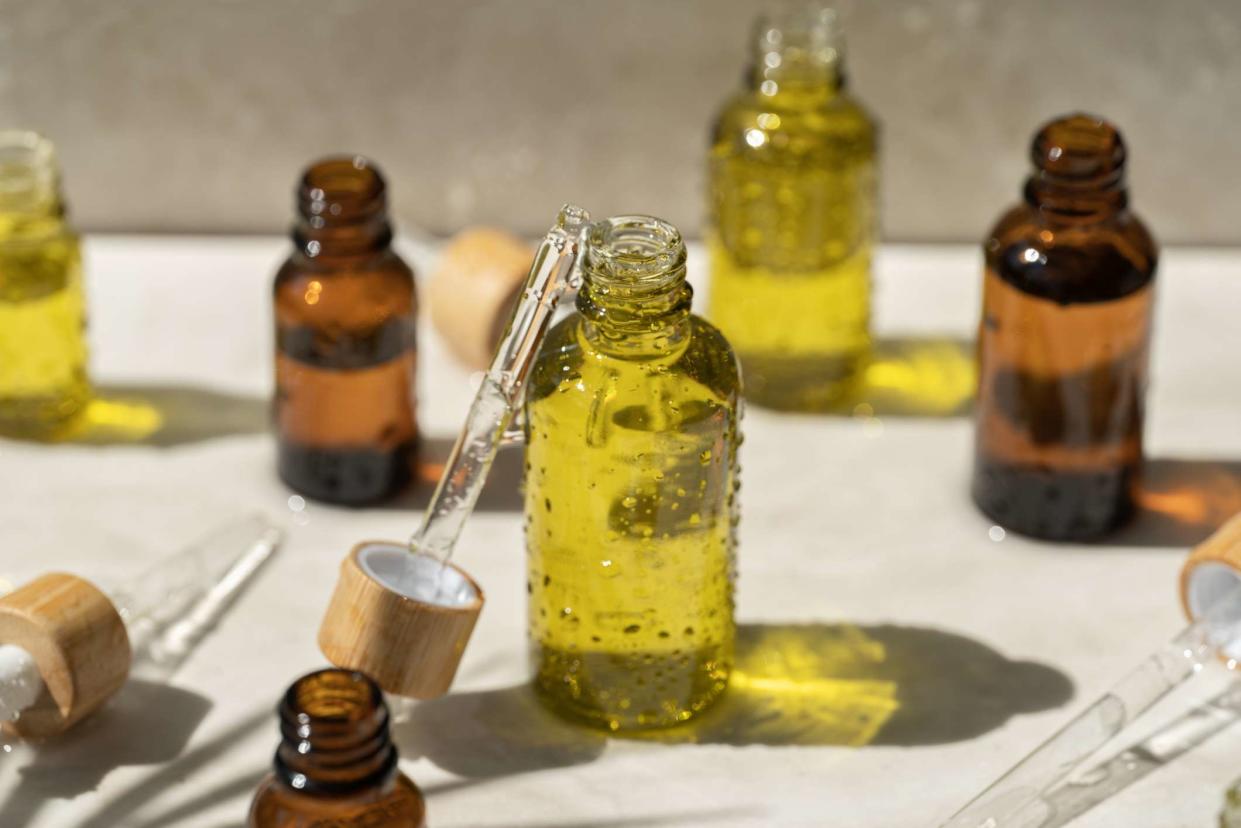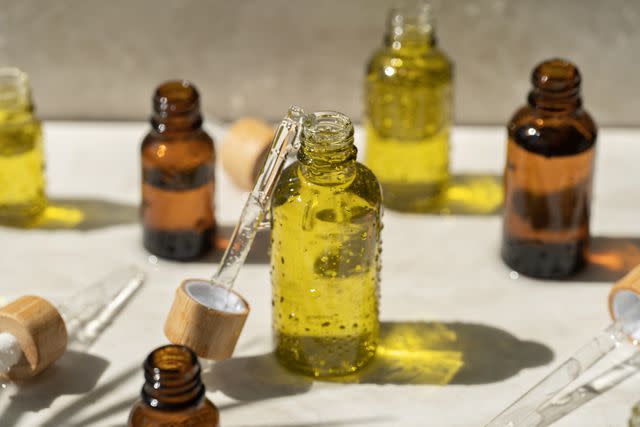How to Use Essential Oils for Psoriasis

Oleksandra Yagello / Getty Images
Medically reviewed by Leah Ansell, MD
The evidence on the use of essential oils for treating psoriasis isn't conclusive, but some research suggests certain oils, such as lavender or tea tree oils, may be useful in providing skin and scalp symptom relief.
Essential oils should only be used to treat psoriasis under the guidance of your healthcare provider. They are not a substitute for conventional treatments.
This article will discuss how essential oils may benefit those with psoriasis, which essential oils may be useful, the right (and wrong) ways to prepare oils for use, and conventional psoriasis treatments.

Oleksandra Yagello / Getty Images
The Link Between Essential Oils and Psoriasis
Psoriasis is an inflammatory, autoimmune condition involving reddened, raised skin lesions. These symptoms can be distressing and even debilitating.
Some essential oils may be helpful in soothing symptoms when applied topically (on the skin). They may also help with stress relief for those coping with the effects of psoriasis. Stress can trigger a psoriasis flare.
It's important to discuss using essential oils with your healthcare provider before starting treatment. Products containing essential oils are typically intended to be applied to intact skin. Psoriasis changes the skin barrier, which could affect how the product works.
Before using them, note that essential oils:
Need to be prepared properly to be safely used
Are highly volatile and require careful storage conditions
Are not regulated, and the quality of products can vary widely.
May be labeled inaccurately for the ingredients contained within
Should never be ingested
Topically
Research is being done to examine if using essential oils in cosmetic products, such as creams, emulsions, and hair products, could be therapeutic for skin conditions such as psoriasis.
Undiluted essential oils should never be applied directly to the skin. This could cause side effects such as irritation, allergic contact dermatitis, and skin darkening.
Stress Relief
Certain essential oils, particularly lavender, may help relieve stress. Some people with psoriasis may find that lavender scent can help relieve anxiety and promote better sleep.
Keep Away From Children
Be sure to store essential oils and products that contain them out of the sight and reach of children. Ingesting essential oils can cause serious side effects that may be life-threatening.
Essential Oils to Try for Psoriasis Symptoms
Essential oils have not been proven to be effective for treating psoriasis symptoms, but research has been conducted on several essential oils, including:
Tea tree
Chamomile
Lavender
Bergamot
Tea Tree Oil
Tea tree oil is believed to have antiseptic and anti-inflammatory qualities. While this hasn't been proven with scientific evidence, some people find relief for their scalp psoriasis using shampoos that contain tea tree oil.
Tea tree oil should be used with care. While most people can use topical products containing tea tree oil without issue, some may experience an allergic reaction or skin irritation.
Never swallow tea tree oil. This could cause serious problems such as:
Breathing difficulties
Confusion
Ataxia (loss of muscle coordination)
Coma
Chamomile
Chamomile can be found in several forms, including as an essential oil. When tested against a placebo (inactive treatment), one study found that chamomile oil applied to psoriasis lesions was effective at treating symptoms of plaque psoriasis, with a low incidence of side effects.
Another study found that applying chamomile to the skin was as effective against psoriasis symptoms as hydrocortisone and more effective than diflucortolone (a topical steroid).
More research is needed, but these results suggest chamomile could be a well-tolerated treatment for psoriasis.
Lavender
Lavender oil has been studied to treat several conditions, but there isn't enough high-quality research to conclusively say it is effective in treating any one condition.
Lavender oil is believed to have a number of qualities that could be beneficial to healthcare, such as:
Antibacterial
Antifungal
Antiseptic
Antiviral
Antioxidant
Sedative
Used in a topical preparation, lavender oil may help relieve skin problems such as skin inflammation, psoriasis, or eczema.
When used in aromatherapy, lavender oil may help to promote sleep and relieve anxiety and stress.
Bergamot
Bergamot essential oil comes from the rind of the bergamot citrus fruit. It may help soothe inflamed skin, and relieve symptoms of psoriasis.
One study found that bergamot essential oil applied on psoriatic plaques 30 minutes before treatment with ultraviolet B (UVB), three times weekly, showed improvement in the Psoriasis Area and Severity Index (PASI) compared to baseline. It also found a reduction in the number of treatments compared to UVB treatment alone.
CBD Oil for Psoriasis
Several studies have found that cannabidiol (CBD) may help treat psoriasis, primarily because of its effects on inflammation.
CBD should be considered a complementary treatment used with conventional psoriasis treatments, not in place of them. Talk to your healthcare provider before using CBD, including over-the-counter products.
More studies are needed on the safety and efficacy of using CBD for medical treatments. The risks of using CBD products on people with inflammatory skin conditions such as psoriasis have not been carefully studied.
Coconut Oil: A Multipurpose Psoriasis Remedy
Studies on virgin coconut oil (VCO) as a treatment for psoriasis have found that VCO:
Has an emollient effect (forming a film on the skin to retain moisture and soothe the skin) that can help improve psoriasis
Has an anti-inflammatory action
May increase the content of the proteins involucrin and filaggrin, which are involved in barrier skin function and are usually disturbed in people with psoriasis
Showed more efficacy against skin lesions than mineral oil
Decreased inflammation better than olive oil
When to See a Healthcare Provider
Talk to your healthcare provider before using essential oils, or products that contain them, to treat your psoriasis.
See your healthcare provider if you notice an itchy red rash, hives, or other adverse symptoms after applying essential oils. This could indicate an allergic reaction.
Traditional Use of Healing Plants For Psoriasis
Aloe vera, a succulent plant, is often used to help skin ailments such as burn and wound healing. It is believed to have anti-inflammatory, analgesic (pain relieving), and antipruritic (itch-relieving) properties. Some studies have found that aloe vera may reduce redness and scaling from psoriasis.
Apple cider vinegar applied to the scalp several times a week may help relieve scalp itch associated with psoriasis. Do not apply apple cider vinegar if you have open wounds or cracked or bleeding skin. If you experience a burning sensation, dilute the apple cider vinegar with an equal amount of water, and rinse the skin once the solution has dried.
The Wrong Way to Mix Essential Oils for Psoriasis
Essential oils should never be applied directly to the skin. They need to be mixed with a carrier before topical application.
Essential oils are not water-soluble, meaning they can't be dissolved into water, and should not be mixed with water as a carrier. Typically, they can be mixed with fixed oils, ether, or alcohol.
To safely use essential oils topically, they can be mixed with carrier oils (usually plant-based oils that dilute the essential oil) and massaged into the skin. Carrier oils may include:
Olive oil
Jojoba oil
Avoid using diffusers (small appliances that produce scented vapor) when using essential oils for aromatherapy. Some essential oils can be irritating. For example, peppermint oil can have a negative effect on children younger than 30 months and people with a fast heartbeat.
Instead of diffusers, try:
Aromatherapy accessories include keychains, necklaces, or bracelets that contain absorbent materials. Oils are applied, and you can sniff them as desired.
Aroma sticks are small plastic sticks with an absorbent wick to soak up essential oil and a cover to hold the scent in until you want to smell it.
What to Look for When Buying Essential Oils
Considering the product's quality is very important when looking for essential oils. Essential oils aren't government regulated, so there is no official grading system or certification to verify quality. "Therapeutic grade" is a marketing term and can't be used to determine quality.
Determining which products are good-quality can be difficult. Johns Hopkins Medicine recommends using the following tips when shopping for essential oils:
Check the label: Look for the Latin name of the plant, the country in which the plant was grown, and information on purity/other added ingredients.
Research and evaluate the company: Buy from well-known and reputable companies that have been in business for several years or more.
Choose products that come in dark-colored glass containers: Because pure essential oils are highly concentrated, they can dissolve plastic bottles over time. Brown or blue glass bottles can protect the quality of the oils.
Avoid "fragrance oils" and "perfume oils": These may not contain essential oils or may combine essential oils combined with other chemicals. They shouldn't be used for aromatherapy. Look for 100% single-ingredient essential oil with no fillers.
Check the price: While essential oils have a range of prices, depending on the oil, if you see an expensive oil sold for a much lower price, it likely is not pure.
Conventional Psoriasis Treatments to Try With Essential Oils
The primary goal of any treatment for psoriasis is symptom control. Conventional treatments include:
Topical treatments: Most commonly, corticosteroids are used, but may include vitamin D analogs, keratolytics, coal tar, retinoids, and dithranol.
Ultraviolet (UV) light therapy: Treatments using a narrowband of UVB or UVA therapy combined with the systemic drug psoralen (PUVA) may be preferred when there are large areas of widespread psoriatic plaques. These treatments can help lesions heal faster, resulting in a longer remission period.
Traditional systemic medications: Most commonly, the immunosuppressants methotrexate and cyclosporine and the retinoid acitretin are used. Immune modulators like Otezla (apremilast) may also be used. These medications can have serious side effects, particularly when used long-term, and are not appropriate for everyone.
Biologics: Medications such as Enbrel (etanercept), Remicade (infliximab), Humira (adalimumab), Cosentyx (secukinumab), Taltz (ixekizumab), Tremfya (guselkumab) and Skyrizi (risankizumab). Stelara (ustekinumab) help to control psoriasis by targeting the overactive immune system.
Summary
The research is inconclusive, but some studies suggest that essential oils such as tea tree, chamomile, lavender, and bergamot may help relieve psoriasis symptoms when used topically. Lavender oil used in aromatherapy may help relieve stress and promote sleep.
CBD may also be useful for psoriasis, but more research on safety and efficacy is needed.
Essential oils should never be ingested or applied directly to the skin. Carrier oils, such as coconut oil, should be used when applying essential oils topically. Keep essential oils and products containing them out of reach of children.
Conventional treatments for psoriasis include topical treatments, UV therapy, traditional systemic medications, and biologics. Always consult your healthcare provider before using essential oils to treat your psoriasis.

